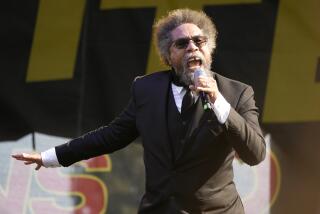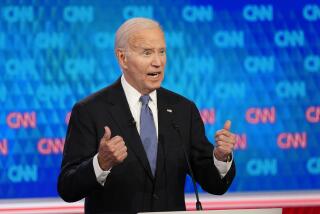Longtime Gore Aide Maps ’96 Campaign : Reelection of Democratic ticket is Peter Knight’s job. But he’s well placed for boss to run in 2000.
- Share via
WASHINGTON — As free safety on the Cornell University football team, Peter S. Knight led the Ivy League in interceptions in 1972. He also set a school record for punt returns in one game--eight against Princeton.
His specialty, it seemed, was securing the ball for the Cornell offense.
He has much the same job today as manager of the Clinton-Gore reelection campaign. If the GOP starts to move, Knight’s assignment is to help get the momentum back to the White House.
That suits the unobtrusive Knight just fine. He’s used to the political game, having served as administrative assistant and chief money man for Al Gore for 12 years when the vice president was a member of Congress.
Along with Clinton’s chief media strategist, Bob Squier, Knight is a prime example of the longtime Gore aides who are carefully salted through key posts in Clinton’s White House and campaign. Like Gore, Knight is more comfortable, for now, playing a supporting rather than leading role. But also like him, he is well positioned to begin laying the foundation for Campaign 2000 even as Campaign 1996 moves into its final phase.
The departure of Clinton’s top strategist, Dick Morris, after a tabloid story alleging he had a yearlong affair with a prostitute, will broaden the portfolios of all the remaining campaign aides. Still Knight’s title of “campaign manager” sounds grander than the actual job. All presidential reelection bids are directed by the White House, despite Knight’s assertion in a recent interview that the campaign was going to be run out of his office after the Democratic National Convention.
In fact, the “reelect committee” is handling the nuts and bolts: polling, state organizations, get-out-the-vote efforts, research and compliance with election laws.
The campaign’s real meat--message, issues, advertising, scheduling--remains the sole province of the political team at the White House. And while Knight, 45, is part of this brain trust, he is outranked by several other administration aides--including senior advisor George Stephanopoulos, Chief of Staff Leon E. Panetta and Deputy Chief of Staff Harold M. Ickes.
If any of this bothers Knight, he hides it well. “There is a large team involved,” he said. “At various times, different parts will have greater focus.”
“Peter has the absolute perfect ego for a job like this--which is to say, none,” said Roy Neel, a former “bunkmate” of Knight’s in Gore’s campaigns and congressional offices and now the chief executive of the U.S. Telephone Assn.
“He has no illusions about his role in the context of his clients, the president and vice president. He is a builder and a fence mender and not one who creates turmoil and conflict just to satisfy some sort of bizarre political instinct,” Neel said.
Knight grew up in the middle-class suburbs of Boston. After graduating from Cornell, he moved to Washington, working briefly at the Justice Department before joining the staff of the late Rep. Torbert H. McDonald of Massachusetts.
After McDonald’s death in 1976, Knight went to work for Gore, then a freshman representative from Tennessee. Gore moved up to the Senate in 1984, and Knight went with him. The two “grew up together in politics,” said a mutual friend, Washington attorney Nicholas Allard.
Knight directed Gore’s failed 1988 presidential bid. Afterward, he joined an influential Washington law firm.
Knight has been an effective, low-profile lawyer-lobbyist, representing defense giant Lockheed Martin, the waste disposal firm Browning Ferris Industries and various telecommunications companies, including Pacific Telesis.
Knight’s clients have been generous contributors to the Clinton cause. Corporations represented by him bought $435,000 worth of seats to a $12.5-million Democratic dinner during the summer, the largest party fund-raiser ever, according to a Wall Street Journal study.
When Gore was tapped as Clinton’s running mate in 1992, Knight took a leave of absence from his law firm to run Gore’s campaign; within a week, he had raised $3 million for the ticket, Neel said.
Knight was deputy director of personnel at the start of Clinton’s presidency, handling mostly middle- and low-level appointments. He returned to lobbying in 1993, but two years later the reelection committee called.
“He’s not in the glamour end of politics, but if you asked any senior person in our party to name one of the 10 most important movers and shakers in the party, he’d be on every list,” said Ron Klain, Gore’s chief of staff. “He always gets the job done, and does it without a lot of whining and complaining.”
Knight’s hiring cannot be ascribed solely to party loyalty, competence and fund-raising prowess. Although he and others involved in the campaign strenuously deny that his being chosen has anything to do with Gore’s likely campaign for the presidency in 2000, it almost certainly was a factor in his selection.
Clinton’s 1992 campaign manager, David Wilhelm, went on to serve two years as Democratic Party chairman. If Knight were to do likewise, either immediately or a couple of years down the road, he would be in position to substantially assist Gore’s cause. Even without that post, Knight will be picking up valuable chits during this campaign that he may be able to cash in later.
A close friend of Gore and Knight said the reelection post was seen as a “good warmup” for 2000, when Gore may face retired Gen. Colin L. Powell.
“You don’t think that was a big piece of it?” asked a friend who requested anonymity. “But I would never confirm that.”
(BEGIN TEXT OF INFOBOX / INFOGRAPHIC)
Clinton’s Key Players
By contrast with the youthful “war room” team of 1992, the people running Bill Clinton’s re-election effort are mostly veterans of Democratic politics, several with close ties to Vice President Al Gore. Despite speculation about a return of 1992 strategist James Carville, aides say no one is likely to be added to the campaign to replace Dick Morris, who resigned last week after reports he consorted with a prostitute.
WHITE HOUSE
Harold M. Ickes--White House deputy chief of staff, has overall authority over campaign and coordinating White House and campaign activites. A New York labor lawyer and veteran of the party’s liberal wing, he has worked in the past for Sen. Edward M. Kennedy and the Rev. Jesse Jackson.
George Stephanopoulos--The remaining player from the 1992 team serves as Clinton’s Senior Adviser, with a broad role overseeing the “message” side of the campaign--what Clinton says, both in speeches and in advertising.
Doug Sosnick--White House political director. Responsible for maintaining links between the White House and Democratic constituencies and campaign organizations.
****
CAMPAIGN
Peter Knight--Campaign manager. Responsible for the nuts and bolts of the campaign apparatus. A veteran fundraiser and longtime aide to Gore.
Robert Squier--Media strategist. One of the party’s best known advertising men, he was brought into the campaign by Gore and by Morris. Now, his influence is likely to grow because of Morris’ departure. Responsibilities include developing ads and deciding what states to target.
Mark Penn--Pollster. Campaign officials say he actually developed many of the “family friendly” initiatives for which Morris took credit. His role is expected to grow with Morris’ departure.
Ann Lewis--Communications director. Oversees campaign press and public relations.
More to Read
Get the L.A. Times Politics newsletter
Deeply reported insights into legislation, politics and policy from Sacramento, Washington and beyond. In your inbox twice per week.
You may occasionally receive promotional content from the Los Angeles Times.










